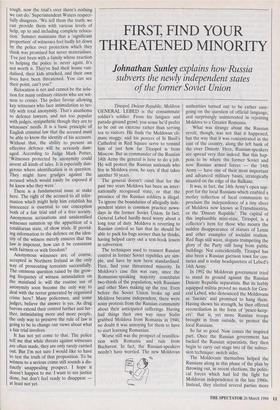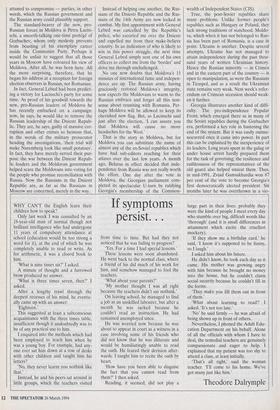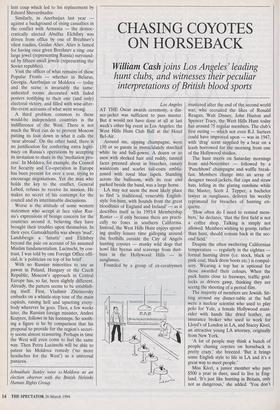FIRST, FIND YOUR THREATENED MINORITY
Johnathan Sunley explains how Russia
subverts the newly independent states of the former Soviet Union
Tiraspol, Dniestr Republic, Moldova GENERAL LEBED is the consummate soldier's soldier. From his fatigues and parade-ground growl, you sense he'd prefer to be out on exercise rather than serving tea to visitors. He finds the Moldovan cli- mate muggy, and his posters of St Basil's Cathedral in Red Square serve to remind him of just how far Tiraspol is from Moscow. But as commander of the Russian 14th Army the general is here to do a job. He will protect the Russian nationals who live in Moldova even, he says, if that takes another 50 years.
The general doesn't mind that for the past two years Moldova has been an inter- nationally recognised state, or that the presence of the Russian soldiers is illegal. To ignore the boundaries of allegedly inde- pendent states is common practice nowa- days in the former Soviet Union. In fact, General Lebed hardly need worry about a long tour of duty. Moldova is reverting to Russian control so fast that he should be able to pack his bags sooner than he thinks, having helped carry out a text-book lesson in subversion.
The techniques used to reassert Russian control in former Soviet republics are sim- ple, and have by now been standardised. First, find your threatened minority. In Moldova's case this was easy, since the Romanian-speaking majority constitutes two-thirds of the population, with Russians and other Slays making up the rest. Even before the Soviet Union broke up and Moldova became independent, there were noisy protests from the Russian community about their anticipated sufferings. Having had things their own way since Stalin grabbed Moldova from Romania in 1940, no doubt it was annoying for them to have to start learning Romanian.
Worse still was the prospect of reunifica- tion with Romania and rule from Bucharest. In fact, the Russian-speakers needn't have worried. The new Moldovan authorities turned out to be rather easy- going on the question of official language, and surprisingly uninterested in rejoining Moldova to a Greater Romania.
What was strange about the Russian revolt, though, was not that it happened, but the way that it was concentrated in the east of the country, along the left bank of the river Dniestr. Here, Russian-speakers are spread very thin indeed. But this hap- pens to be where the former Soviet and now Russian armed forces — the 14th Army — have one of their most important and advanced military bases, strategically situated on the edge of the Balkans.
It was, in fact, the 14th Army's open sup- port for the local Russians which enabled a motley collection of local communists to proclaim the independence of a tiny sliver of Moldova now known as Transdniestria, or the `Dniestr Republic'. The capital of this implausible mini-state, Tiraspol, is a collector's item for those who mourn the sudden disappearance of statues of Lenin and other examples of socialist realism. Red flags still wave, slogans trumpeting the glory of the Party still hang from public buildings. Not coincidentally, Tiraspol has also been a Russian garrison town for cen- turies and is today headquarters of Lebed's 14th Army.
In 1992 the Moldovan government tried to stand its ground against the Russian Dniestr Republic separatists. But its feebly equipped militia proved no match for Gen- eral Lebed, who denounced the Moldovans as 'fascists' and promised to hang them. Having shown his strength, he then offered reconciliation in the form of 'peace-keep- ers': that is, yet more Russian troops brought in from outside, to protect the local Russians.
So far so good. Now comes the inspired part. Once the Russian government has backed the Russian separatists, they then begin to carry out stage two of the subver- sion technique: switch sides.
The Moldovans themselves helped the Russians along in this phase of the plan by throwing out, in recent elections, the politi- cal forces which had led the fight for Moldovan independence in the late 1980s. Instead, they elected several parties more attuned to compromise — parties, in other words, which the Russian government and the Russian army could plausibly support.
The standard-bearer of the new, pro- Russian forces in Moldova is Petru Lucin- schi, a smooth-talking one-time protégé of Gorbachev, whom only modesty prevents from boasting of his exemplary career inside the Communist Party. Perhaps it would be unfair to suggest that all those years in Moscow have coloured his view of Moldova. After all, he was born here. All the more surprising, therefore, that he began his address at a reception for foreign election observers in Russian, not Romanian.
In fact, General Lebed had been predict- ing a victory for Lucinschi's party for some time. As proof of his goodwill towards the new, pro-Russian leaders of Moldova he has recently embarked on a campaign: now, he says, he would like to remove the Russian leadership of the Dniestr Repub- lic. They are, he says, guilty of massive cor- ruption and other crimes so heinous that, in the words of the military prosecutor heading the investigations, 'their trial will make Nuremberg look like small potatoes'. In fact, they have merely served their pur- pose: the war between the Dniestr Repub- lic leaders and the Moldovan government helped scare the Moldovans into voting for the people who promise reconciliation with Russia. Now the Russians in the Dniestr Republic are, as far as the Russians in Moscow are concerned, merely in the way. Instead of helping one another, the Rus- sians of the Dniestr Republic and the Rus- sians of the 14th Army are now locked in combat. My first appointment with General Lebed was cancelled by the Republic's police, who escorted me over the Dniestr and expelled me from their make-believe country. In an indication of who is likely to win in this power struggle, the next time General Lebed simply sent one of his own officers to collect me from the 'border' and drive me through unchallenged.
No one now doubts that Moldova's 15 minutes of international fame and indepen- dence are up. The Russian army, having graciously restored Moldova's integrity, now expects the Moldovans to warm to the Russian embrace and forget all this non- sense about reuniting with Romania. Per- haps Moldova will be allowed to keep its cherished new flag. But, as Lucinschi said just after the election, 'I can assure you that Moldova will cause no more headaches for the West.'
That is the story in Moldova, but for Moldova you can substitute the name of almost any of the ex-Sovief republics which have had sub-editors reaching for their atlases over the last few years. A month ago, Belarus in effect decided that inde- pendence from Russia was not really worth the effort. One day after the vote in Moldova, the Georgian parliament com- pleted its spectacular U-turn by ratifying Georgia's membership of the Common-
wealth of Independent States (CIS).
True, the post-Soviet republics share many problems. Unlike former people's republics such as Hungary or Poland, they lack strong traditions of statehood. Moldo- va, which when it has not belonged to Rus- sia has been part of Romania, is a case in point. Ukraine is another. Despite several attempts, Ukraine has not managed to attain independence during the past thou- sand years of written Ukrainian history. Hence the Russian minority — in Crimea and in the eastern part of the country — is open to manipulation, as were the Russians in Tiraspol, and as a result the Ukrainian state remains very weak. Next week's refer- endum on Crimean secession should weak- en it further.
Georgia illustrates another kind of diffi- culty. The pro-independence Popular Front, which emerged there as in many of the Soviet republics during the Gorbachev era, performed a key role in hastening the end of the system. But it was easily outma- noeuvred once it came into power. In part this can be explained by the inexperience of its leaders. Long years spent in the gulag or under house arrest hardly prepared them for the task of governing; the resilience and ruthlessness of the representatives of the old guard also helped unseat them. Thus, in mid-1991, Zviad Gamsakhurdia won 87 per cent of the vote to become Georgia's first democratically elected president. Six months later he was overthrown in a vio- lent coup which led to his replacement by Eduard Shevardnadze.
Similarly, in Azerbaijan last year — against a background of rising casualties in the conflict with Armenia — the democ- cratically elected Abulfaz Elchibey was driven from office by one of Brezhnev's vilest toadies, Geidar Aliev. Aliev is famed for having once given Brezhnev a ring: one large jewel (representing Russia) surround- ed by fifteen small jewels (representing the Soviet republics).
Visit the offices of what remains of these Popular Fronts — whether in Belarus, Georgia, Azerbaijan or Moldova — today and the scene is invariably the same: unheated rooms decorated with faded posters testifying to their one (and only) electoral victory, and filled with wise-after- the-event accounts of what went wrong.
A third problem common to these would-be independent countries is the indifference of the West. There is not much the West can do to prevent Moscow putting its foot down in what it calls the 'near abroad'. On the other hand, there is no justification for conferring extra legiti- macy on Russia's operations by accepting its invitation to share in the 'mediation pro- cess'. In Moldova, for example, the Council for Security and Co-operation in Europe has been present for over a year, trying to encourage negotiations. Yet the man who holds the key to the conflict, General Lebed, refuses to receive its mission. He makes no secret of his contempt for the council and its interminable discussions.
Worse is the attitude of some western statesmen who accept at face value Rus- sia's expressions of benign concern for the countries around it, believing they have brought their troubles upon themselves. In their eyes, Gamsakhurdia was always 'mad', Landsbergis a 'fanatic' and Elchibey beyond the pale on account of his assumed Muslim fundamentalism. Lucinschi, by con- trast, I was told by one Foreign Office offi- cial, is 'a politician on top of his brief'.
With no Russian minorities to use as pawns in Poland, Hungary or the Czech Republic, Moscow's approach in Central Europe has, so far, been slightly different. Already, the pattern seems to be establish- ing itself. First, Vladimir Zhirinovsky embarks on a whistle-stop tour of the main capitals, raising hell and upsetting every- body wherever he goes. Then, a few weeks later, the Russian foreign minister, Andrei Kozyrev, follows in his footsteps. So sooth- ing a figure is he by comparison that his proposal to provide for the region's securi- ty seems almost reassuring. Perhaps in time the West will even come to feel the same way. Then Petru Lucinschi will be able to patent his Moldova remedy ('no more headaches for the West') as a universal panacea.
John athan Sunley went to Moldova as an election observer with the British Helsinki Human Rights Group.




























































 Previous page
Previous page